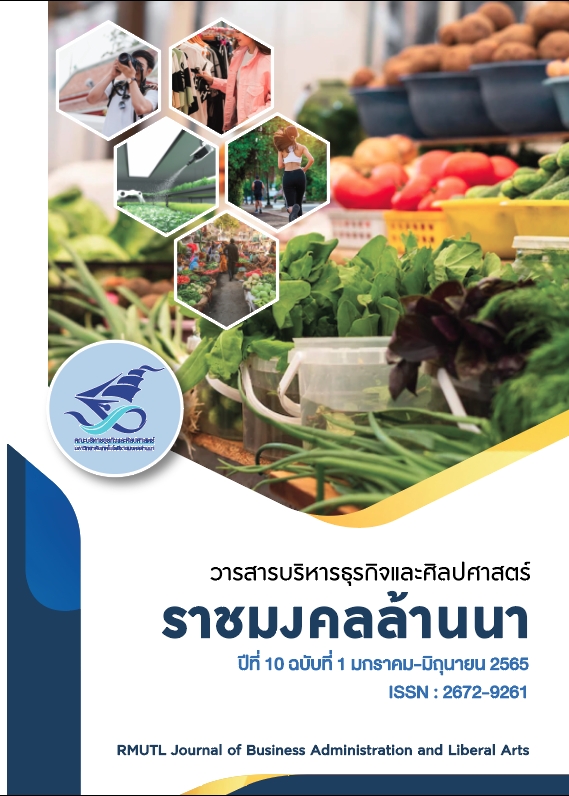Strategic Management for the Survival of Tourism Business During COVID-19 Crisis of Elephant Park in Mae Taeng District, Chiang Mai Province, Thailand
Main Article Content
Abstract
Thesis on “Strategic management for tourism business survival under the COVID-19 crisis of the elephant park in Mae Taeng District, Chiang Mai Province, Thailand.” The main objectives of this research was 1. Study the income situation of the elephant park business in Mae Taeng District, Chiang Mai Province under the COVID-19 situation. 2. To study and analyze the adaptation strategies of elephant park businesses under the COVID-19 situation and analyze the similarities and differences of large and small businesses. This research was conducted using a qualitative research method that consisted of an in-depth interview, a Structured Interview Form, and a field note by the contributor proprietary information and employees of the elephant park in Mae Taeng District Chiang Mai Province. The researcher used simple random sampling by lottery method, which specified quotas for 2 small elephant parks and 2 large elephant parks out of a total of 8 elephants.
The results showed that the COVID-19 epidemic crisis affects the income of the elephant park business in Mae Taeng District, Chiang Mai Province. Studies have shown that the spread of COVID-19 affects the tourism of Thailand foreign tourists cannot enter Thailand. Due to the country's lockdown policy in which foreign tourists are considered a key factor in generating the main income for the elephant parks in Mae Taeng District, Chiang Mai Province and when categorizing the elephant park businesses into large and small, it was found that the average income of large elephant park businesses before the COVID-19 situation and during the COVID-19 situation. The average income rate decreased by 99.87%. The average income of the small elephant park business before the COVID-19 situation and during the COVID-19 situation the average income rate decreased by 97.06%. Compared between the large elephant park business and the small elephant park business, the average income declined equally high. And the adjustment strategy of the elephant park business in Mae Taeng District, Chiang Mai Province of the large elephant park businesses, the use of human resource management strategy was the most important in management, followed by marketing strategy, process strategy and prevention strategies for COVID-19 and financial strategy and the strategy and prevention strategies for COVID-19 were the most, followed by financial strategy and marketing strategy and human resource management strategy. The large elephant park businesses focus on using the human resource management, the overall average was at good ( = 4.12), while the small elephant park businesses focus on the use of process strategy and prevention strategies for COVID-19 as a result as the small elephant park business in Mae Taeng District, Chiang Mai Province under the COVID-19, the overall average was at good (
= 3.60) Other strategies are at a similar level.
This thesis shows characteristics of choosing and using strategies for managing 5 areas of elephant park business with the same and different selection characteristics according to the size of the elephant park. It is important to choose the right one for the operating characteristics of each size. The results of the study will benefit elephant park operators in studying ways to cope with the current COVID-19 crisis.
Article Details

This work is licensed under a Creative Commons Attribution-NonCommercial-NoDerivatives 4.0 International License.
บทความวิจัยนี้เป็นของลิขสิทธิ์
References
Meedian Chumat. (2019). Adaptation theory. Retrieved May 13, 2020, from https://pattanieconomy.word press.com
Nag, R., Hambrick, D.C. and Chen, M-J. (2007). What is strategic management, really? Inductive derivation of a consensus definition of the field”, Strategic Management Journal, 28(9), 935-55.
Suwit Maesincee, Songphon Munkongsujarit, Pranpreya Sriwannawit Lundberg, Kawin Theppatipat and Nathawat Jaruchoktaweechai. (2020). Summary of McKinsey & Company's COVID-19 Analysis. Higher Education Magazine, 46, 502.
Porter, M.E. (1996). An economic strategy for America’s inner cities: Addressing the controversy. The Review of Black Political Economy, 24, 303–336.
Sudjai Diloktasanon. (2015). Strategic Management. 2nd Edition. Bangkok: Samlada.
World Health Organization. (2020). Coronavirus disease (COVID-19). Retrieved May 13, 2020, from https://www.who.int/emergencies/diseases/novel-coronavirus-2019/ question-and-answers-hub/q-a-detail /coronavirus-disease-covid-19
Yipeng Liu & Jong Min Lee & Celia Lee. (2020). The challenges and opportunities of a global health crisis: the management and business implications of COVID-19 from an Asian perspective. Asian Business & Management, 19(3), 277-297.

